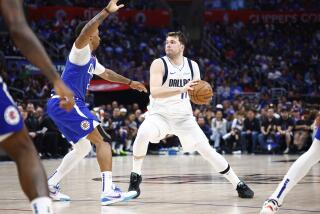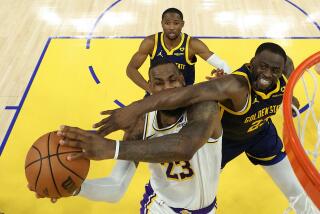NBA deal’s many hoops
The National Basketball Assn. appears poised to end its five-month lockout, and a new labor agreement can’t come soon enough for the thousands of idled workers who don’t have a seat at the negotiating table. Those include the employees and entrepreneurs who make a living inside and around the arenas, as well as the restaurants, hotels and souvenir shops that cater to the surge of fans on game days.
For everyone else, the announcement of a tentative deal is a mixed blessing. The union agreed to let owners slash payrolls by up to $3 billion over the coming decade, with lower maximum pay raises and a slower salary ramp-up for most young players. But given that the typical NBA career is short, most players couldn’t afford to sacrifice the whole season in the hope of wearing down the owners. Besides, the league has little choice but to cut payrolls; collectively, the 30 teams are losing far too much.
The deal also would shorten player contracts and make it prohibitively expensive to exceed the league’s formerly porous salary cap. As a result, players are likely to switch teams more often, and the dynastic big-market franchises (e.g., the Lakers and the Boston Celtics) will have a harder time keeping as many stars. The goal is to let small-market teams put together more competitive lineups, despite their limited ticket sales and television revenue.
Maybe that’s good news for Charlotte Bobcats fans, but as the divergent paths of the San Antonio Spurs and the New York Knicks show, market size is not as important to NBA competitiveness as savvy management and great coaching. Besides, penalizing Lakers owner Jerry Buss for spending profligately to improve his lineup won’t stop him from spending that money, if he can line up more sponsors who want to be associated with a winning basketball brand.
A potentially more important step for the league’s health is the new revenue-sharing arrangement that owners are negotiating among themselves. That will guarantee significantly more money for small-market teams — enough to sign a star — at the expense of the big-city franchises. The additional dollars won’t necessarily help the Bobcats of the league win games, but it will certainly help them lose less money.
As Angelenos, we can’t help but worry about the effects of a deal designed in many ways to reward penny-pinching owners at the expense of those who, like Buss, are willing to turn their pockets inside-out for great players. But with the economy sputtering, we’re more concerned about the lockout’s effects on the other people whose livelihoods depend on professional basketball — workers and small-business owners who don’t have the financial cushions enjoyed by well-heeled team owners or millionaire players. For their sake, it’s good to see the dispute coming to a close.
More to Read
A cure for the common opinion
Get thought-provoking perspectives with our weekly newsletter.
You may occasionally receive promotional content from the Los Angeles Times.










